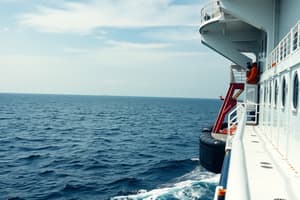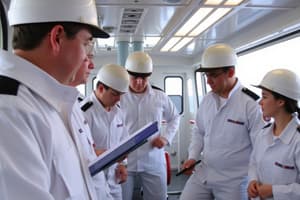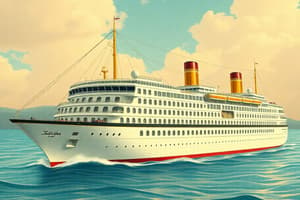Podcast
Questions and Answers
What is one of the key initiatives related to decarbonization in the maritime industry?
What is one of the key initiatives related to decarbonization in the maritime industry?
- Reduction of shipping fees to lower carbon emissions
- Increase in shipping routes to minimize travel distance
- Utilization of traditional fuel oils for efficiency
- Adoption of low and zero-emission fuels such as hydrogen (correct)
Which technology is being integrated into maritime transport to enhance security and transparency?
Which technology is being integrated into maritime transport to enhance security and transparency?
- Social media for customer engagement
- Cloud computing for data storage
- Blockchain technology (correct)
- 3D printing for ship manufacturing
What practice is emphasized in sustainable shipbuilding?
What practice is emphasized in sustainable shipbuilding?
- Neglecting waste management during production
- Focus on circular economy principles (correct)
- Using non-recyclable materials for durability
- Maximizing profits regardless of environmental impact
Which trend involves the development of IoT-enabled infrastructure in ports?
Which trend involves the development of IoT-enabled infrastructure in ports?
What is a significant change anticipated in maritime regulations?
What is a significant change anticipated in maritime regulations?
What innovative delivery method is emerging in maritime logistics?
What innovative delivery method is emerging in maritime logistics?
Which technology is used for improved route planning in maritime operations?
Which technology is used for improved route planning in maritime operations?
What is a major focus in crew training due to evolving regulations?
What is a major focus in crew training due to evolving regulations?
Flashcards are hidden until you start studying
Study Notes
Top 10 Maritime Trends and Innovations in 2025
-
Decarbonization Initiatives
- Adoption of low and zero-emission fuels (e.g., hydrogen, ammonia).
- Increased use of battery-powered vessels for short-distance shipping.
- Implementation of carbon capture and storage technologies.
-
Digitalization and Automation
- Enhanced use of AI and machine learning for predictive maintenance and logistics.
- Autonomous vessels for shipping and fishing operations.
- Integration of blockchain technology for secure and transparent shipping documentation.
-
Sustainable Practices
- Focus on circular economy principles in shipbuilding and operations.
- Adoption of eco-friendly materials and recycling practices in ship dismantling.
- Implementation of sustainable port operations to minimize environmental impact.
-
Smart Ports
- Development of IoT-enabled port infrastructure for efficient cargo handling.
- Use of big data analytics for real-time decision-making in port operations.
- Increased investment in cyber security to protect port logistics systems.
-
E-commerce and Logistics Evolution
- Growth of last-mile delivery solutions using maritime transport.
- Expansion of container shipping to accommodate e-commerce demands.
- Innovations in supply chain management to improve efficiency and reduce costs.
-
Regulatory Changes
- Stricter international regulations on emissions and waste management.
- Compliance with the International Maritime Organization (IMO) strategies for sustainable shipping.
- Increased focus on safety standards and crew training to meet evolving regulations.
-
Advanced Navigation Technologies
- Implementation of augmented reality (AR) and virtual reality (VR) for training and navigation.
- Use of satellite-based tracking systems for improved route planning and safety.
- Development of dynamic positioning systems to enhance vessel maneuverability.
-
Crew Welfare and Skills Development
- Enhanced focus on mental health and well-being of seafarers.
- Investment in training programs for new technologies and automation.
- Promotion of diverse and inclusive work environments in maritime sectors.
-
Resilience and Risk Management
- Stronger emphasis on resilience planning for supply chain disruptions.
- Development of risk assessment tools to address climate change impacts.
- Implementation of contingency plans for global shipping challenges.
-
Collaboration and Partnerships
- Increased collaboration between industry stakeholders for innovation.
- Formation of public-private partnerships to drive sustainable maritime projects.
- Global alliances aimed at sharing best practices and technological advancements.
Decarbonization Initiatives
- Shift towards low and zero-emission fuels like hydrogen and ammonia is prioritized.
- Battery-powered vessels are increasingly utilized for short-distance shipping.
- Carbon capture and storage technologies are being implemented to reduce emissions.
Digitalization and Automation
- AI and machine learning applications are enhancing predictive maintenance and logistics efficiency.
- Autonomous vessels are entering both shipping and fishing sectors.
- Blockchain is being integrated for secure, transparent shipping documentation processes.
Sustainable Practices
- Circular economy principles are being adopted in shipbuilding and operational practices.
- Eco-friendly materials and recycling methods are emphasized during ship dismantling.
- Ports are focusing on sustainable operations to lessen environmental impacts.
Smart Ports
- IoT-enabled infrastructures are being developed for more efficient cargo handling.
- Big data analytics are utilized for making real-time decisions in port operations.
- Cybersecurity investments are increasing to safeguard port logistics systems.
E-commerce and Logistics Evolution
- Maritime transport is seeing a rise in last-mile delivery solutions.
- Container shipping is expanding to meet the growing demands of e-commerce.
- Innovation in supply chain management aims to boost efficiency and cut costs.
Regulatory Changes
- Stricter international regulations are being established concerning emissions and waste management.
- Compliance with International Maritime Organization (IMO) strategies for sustainable shipping practices is essential.
- Focus on safety standards and crew training is intensifying to align with new regulations.
Advanced Navigation Technologies
- Augmented reality (AR) and virtual reality (VR) are being utilized for vessel training and navigation.
- Satellite-based tracking systems are improving route planning and safety measures.
- Dynamic positioning systems are being developed to enhance vessel maneuverability.
Crew Welfare and Skills Development
- Mental health and well-being of seafarers are receiving increased attention.
- Investment in training programs focuses on technologies and automation updates.
- Diverse and inclusive work environments are being actively promoted in maritime sectors.
Resilience and Risk Management
- Emphasis on resilience planning has intensified in response to supply chain disruptions.
- Development of risk assessment tools is addressing climate change impacts within the sector.
- Contingency plans are being formulated to tackle global shipping challenges.
Collaboration and Partnerships
- Industry stakeholders are increasingly collaborating to drive innovation.
- Public-private partnerships are forming to promote sustainable maritime projects.
- Global alliances are aimed at sharing best practices and advancing technological initiatives.
Studying That Suits You
Use AI to generate personalized quizzes and flashcards to suit your learning preferences.




